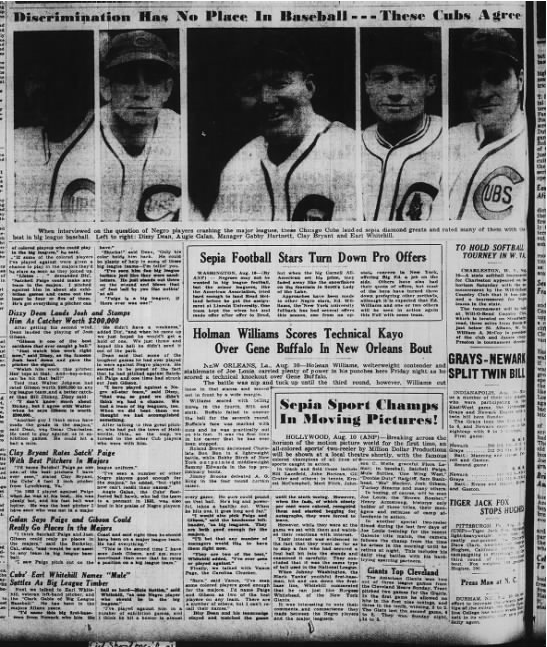
Newspaper by Wendell Smith, titled "Discrimination
Has No Place In Baseball... These Cubs Agree."
Source: Newspapers.com
(Wheat's Landscape, Athletic Field Maintenance)

Newspaper by Wendell Smith, titled "Discrimination
Has No Place In Baseball... These Cubs Agree."
Source: Newspapers.com
" After less than a year on the job, Smith put a sportswriter’s spin on Civil Rights by interrogating baseball’s color line. Smith’s first big story emerged during 1939 when he interviewed over fifty white National League players and managers about their thoughts on segregation in baseball. Over 75 percent stated they had no problem with blacks in the major leagues. Smith used this data to put pressure on major league club owners who claimed players would never tolerate a black teammate."
~ Journalism Team for the National Baseball Hall of Fame, 2007
The newspaper article that Wendell Smith produced, forced white players' hands in the direction of supporting the Civil Rights Movement. Fear of being perceived as racist, the white players responded by saying they supported integration. As a result, white Major League baseball lost its strongest reason for segregation.
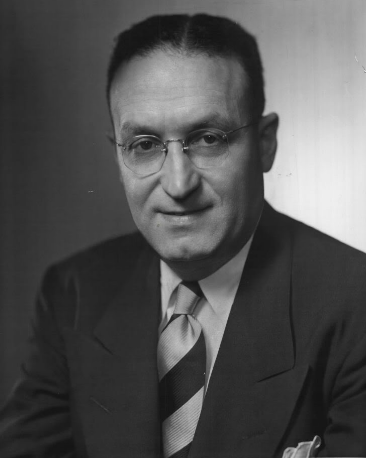
Isadore Muchnick
Source: Jackie With the Monarchs
"Aware that Isadore Muchnick, a Boston councilman, was in a tight race for re-election in a predominantly black neighborhood, Smith told Muchnick that if he wanted the black vote he should include in his platform a call for black players to be given the opportunity to play in the big leagues."
"Smith was fearful that if he took a half-dozen players 'the reaction would be negative.' He took three: Marvin Williams, a second baseman with the Philadelphia Stars; outfielder Sam Jethroe of the Cleveland Buckeyes, a high-average spray hitter with outstanding speed; and Robinson, recently discharged from the Army and a promising infielder with the Kansas City Monarchs."
~ Jerome Holtzman, Chicago Tribune baseball columnist, 1993
Wendell Smith's suggestion to Isadore Muchnick resulted in a tryout at Fenway park for the three young ballplayers, who were each hand picked by Wendell himself.
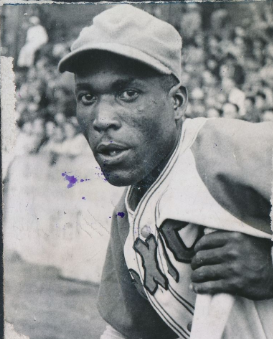
Marvin Williams
Source: The Hall of Miller and Eric
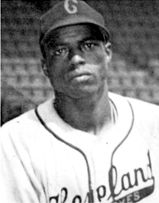
Sam Jethroe
Source: Negro Leagues Baseball eMuseum
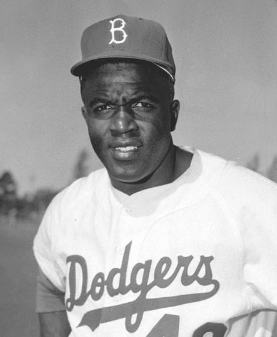
Jackie Robinson
Source: The American Prospect
"Robinson wasn't the best player, but he was the best player at that time for this particular situation. I picked him because he had played on an integrated team. He was a college man, UCLA, a great athlete who had played all the major sports-football, basketball and baseball."
~ Wendell Smith, 1945
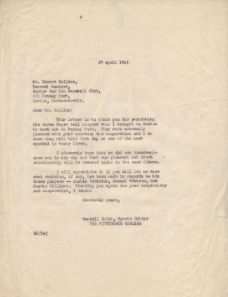
Letter from Wendell Smith to Eddie Collins
regarding the tryout at Fenway Park.
Source: The National Baseball Hall of Fame
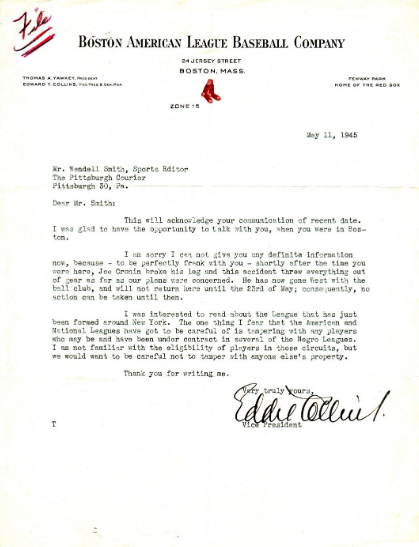
Letter from Eddie Collins to Wendell Smith
in response to Smith's letter (left)
Source: The National Baseball Hall of Fame
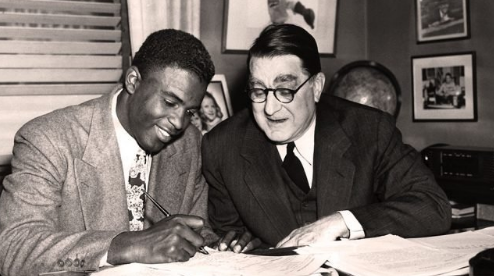
Jackie Robinson (left) signing a contract to play for Brooklyn
Dodgers manager Branch Rickey (right).
Source: Investor's Business Daily
"Late in 1945, Smith and Brooklyn Dodgers General Manager Branch Rickey discussed the possibility of signing a black player. It was Smith who first suggested Jackie Robinson to Rickey. At Smith’s recommendation and after extensive Dodgers scouting and face-to-face meetings, Rickey signed Jackie and assigned him to the Montreal Royals, a triple-A minor league club. Rickey then hired Smith to travel with Jackie throughout the 1946 and 1947 seasons to offer support and counsel."
~ The National Baseball Hall of Fame, 2007
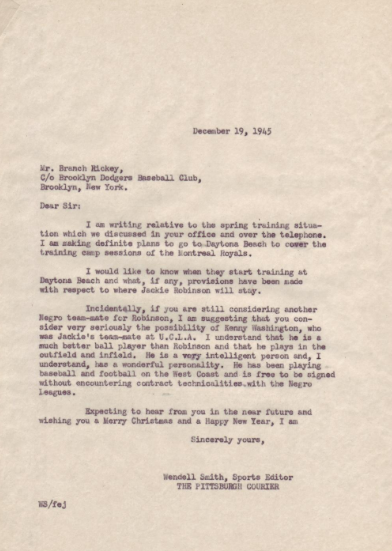
Letter from Wendell Smith to Branch Rickey regarding
pre-season training in Daytona Beach, Florida. He
also mentions recruiting another black player to
accompany Jackie Robinson.
Source: The National Baseball Hall of Fame
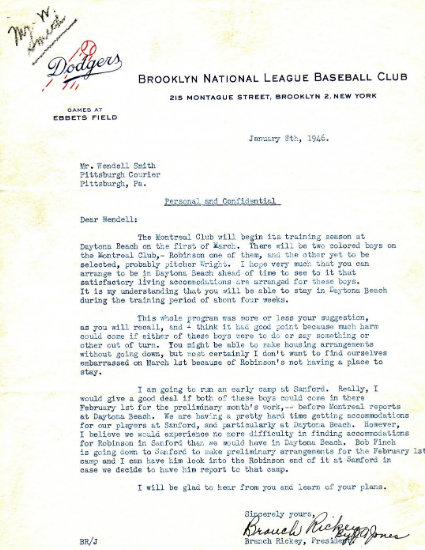
Letter from Branch Rickey in response to Wendell's
letter. He mentions a black pitcher named Wright
who had played alongside Robinson and assures
Wendell that he has housing for Robinson in Daytona.
Source: The National Baseball Hall of Fame
Wendell Smith offered the names of several African American baseball players that he saw fit to play with Jackie Robinson on the Dodgers, one of which was Kenny Washington, a former teammate who played with Robinson at the U. C. L. A. He not only promoted black players, but he also acted as a public relations agent for the Dodgers.
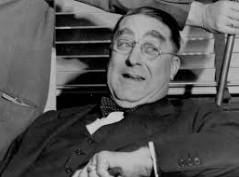
Branch Rickey
Source: The National Baseball Hall Of Fame
"The Montreal Club will begin its training season at Daytona Beach on the first in March. There will be two colored boys on the Montreal Club, - Robinson one of them, and the other yet to be selected, probably pitcher Wright.
"This whole program was more or less your suggestion, as you will recall, and I think it had a good point."
~ Branch Rickey to Wendell Smith, January 8, 1946

Logo of the Chicago Heral-American during the 1900's
Source: hobbydb.com
"In 1948 Smith accepted a job with the Chicago Herald-American (which would later change its name to Chicago’s American), becoming the first black sportswriter at a white newspaper. That same year he became the first black member of the Baseball Writers’ Association of America."
~ The National Baseball Hall of Fame
Shortly after Wendell's transition to the Chicago Herald-American, he felt that Jackie Robinson was prepared to continue his journey in Major League Baseball on his own. Slowly, Wendell began to distance himself from Robinson, but would continue to promote baseball's integration.
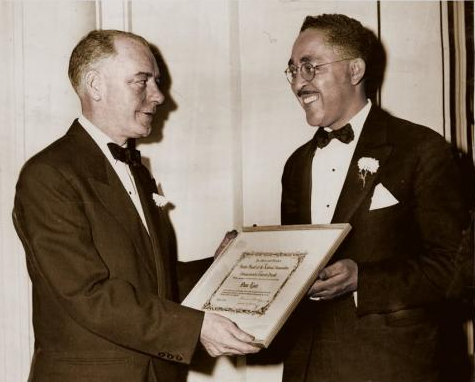
Wendell Smith recieves an award from Dave Egan for his excellent reporting
skills with the Chicago American
Source: AwesomeStories.com
It was this same year that Wendell became the first African American member of the Baseball Writer's Association of America
"Wendell Smith, Chicago's American, and a few black newspapers officially launched a campaign in January 1961 to end spring training segregation. Black players had protested their treatment in Florida for years, but teams deferred to local custom and were slow to change."
~ The National Baseball Hall of Fame
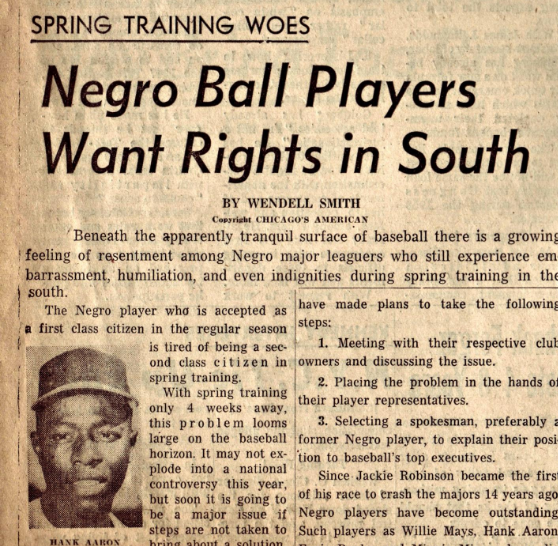
Article By Wendell Smith makes people aware of
the racism some of their favorite ballplayers
face down South.
Source: The National Baseball Hall of Fame
"Beneath the apparently tranquil surface of baseball there is a growing feeling of resentment among Negro major leaguers who still experience embarrassment, humiliation, and even indignities during spring training in the south. The Negro player who is accepted as a first class citizen in the regular season is tired of being a second class citizen in spring training."
~ Wendell Smith, Chicago's American, January 23, 1961
In the newspaper to the left, Smith wrote out his plan of action step by step:
"1. Meeting with their respective club owners and discussing the issue.
2. Placing the problem in the hands of their player representatives.
3. Selecting a spokesman, perferably a former Negro player, to explain their position to baseball's top executives."
~ Wendell Smith, Chicago's American, January 23, 1961
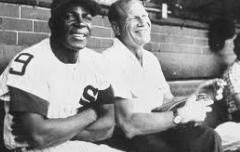
Bill Veeck (right) and Minnie Minoso (left).
Source: LavidaLaBaseball.com
"During the Chicago's American campaign, Smith highlighted the voices of black baseball stars of the past and present, most notably Hank Aaron, Larry Doby, Elston Howard, Ernie Banks, and Minnie Minoso. The campaign met its first major success in March 1961 when then White Sox owner Bill Veeck cancelled hotel reservations once he discovered the hotel would not house black players. By the end of June, the Players’ Association endorsed the campaign."
~ The National Baseball Hall of Fame
The articles Wendell Smith wrote moved Bill Veeck on a deeper level, and resulted in Veeck buying a Florida hotel in order to integrate spring training further.
Wendell was selected to be a part of the Hall of Fame Negro League Commitee. The group's first action was to admit Satchel Paige into the National Baseball Hall of Fame. They did the same for several other black ballplayers until 1972, the year Smith died of cancer.
"[Bowie] Kuhn successfully convinced the Hall of Fame to establish a committee that would select former Negro leaguers to be honored. The committee included five men with Negro leagues playing experience (Monte Irvin, Roy Campanella, Bill Yancey, Frank Forbes, Judy Johnson), two former Negro leagues team owners (Alex Pompez, Eddie Gottlieb), a former major league player and former president of the NCAA (Eppie Barnes), and two journalists (Wendell Smith, Sam Lacy)."
~ The National Baseball Hall of Fame
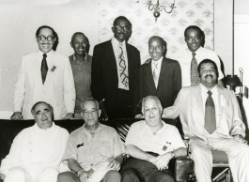
Hall of Fame Negro Leagues Committee in 1971.
Top Row (left to right): Wendell Smith, Judy Johnson, Satchel
Paige, Sam Lacy, and Monte Irvin. Bottom Row (left to right): Joe Reichler,
Frank Forbes, Eddie Gottlieb, and Roy Campanella.
Source: The National Baseball Hall of Fame
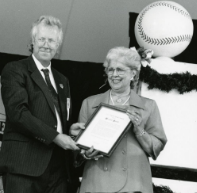
Wendell Smith's widow, Wyonella Smith,
recieves the J.G. Taylor Spink Award
in place of her late husband, 1993.
Source: The National Baseball Hall of Fame
"His contributions over the years were finally recognized when in 1993, he was posthumously awarded the J.G. Taylor Spink Award, the highest honor given by the Baseball Writers Association of America."
~ Great Black Heroes
"Since Smith’s death, numerous organizations have recognized his importance within the realms of sport, journalism, and civil rights. In 1993, Smith became the first African-American recipient of the J.G. Taylor Spink Award for meritorious contributions to baseball writing, accepted by his widow Wyonella."
~ The National Baseball Hall of Fame
Video recording of Wyonella Smith recieving the J.G. Taylor Spink Award on behalf of her late husband, Wendell Smith.
Source: The National Baseball Hall Of Fame
Wendell Smith is inducted into the writers' wing of the Baseball Hall of Fame.
"In 2013, Andre Holland portrayed Smith in the Jackie Robinson biopic film 42 showing Smith’s contributions to a wide audience."
"Also in 2013, the Shirley Povich Center for Sports Journalism at the University of Maryland’s Philip Merrill College of Journalism created the Sam Lacy-Wendell Smith Award to be presented annually to a sports journalist or broadcaster who has made significant contributions to racial and gender equality in sports."
~ The National Baseball Hall of Fame
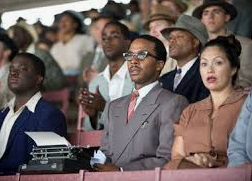
Andre Holland as Wendell Smith in the
movie 42, 2013
Source: NY Daily News
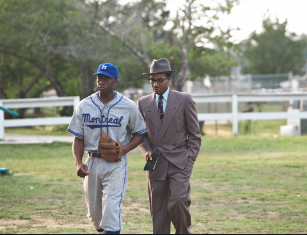
Chadwick Boseman (left) and Andre Holland
(right) portray Smith and Robinson in the
movie 42, 2013
Source: NY Daily News
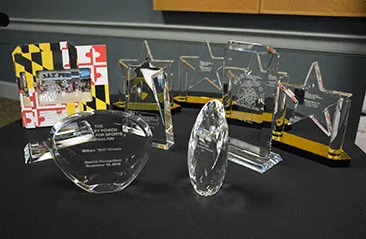
Michael Wilbon, sportswriter and co-host of ESPN's
"Pardon the Interruption", was the winner of the
Lacy-Smith award in March, 2018
Source: University of Maryland
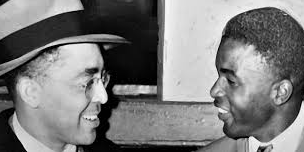
Wendell Smith (left) and Jackie Robinson (right)
Source: Great Black Heroes
" In 2014, the memory of Smith’s life saw more attention when the Associated Press Sports Editors posthumously awarded Smith the Red Smith Award."
~ The National Baseball Hall of Fame
"I think it’s wonderful; I’m deeply honored. After all this time, it’s wonderful. It’s a surprise. I was really surprised, but I am just deeply honored that he was remembered so, and respected and that his contribution has been acknowledged."
~ Wyonella Smith